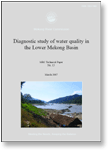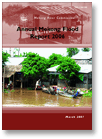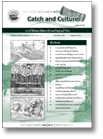Mekong News - Archive
July - September 2007
Issue 2007/3
In this issue:
- Donors, countries discuss plans for MRC
- Data input issues dominate 5th Mekong Flood Forum
- HYCOS stations selected
- Sediment study on Great Lake
- Fisheries experts take knowledge to the region
- MRC Secretariat CEO completes term of office
- Japan supports Hydropower Programme through ASEAN
- MRC maps floods for Chiang Rai
- Indices will help spread health message
- Information Products
- Upcoming events
Donors, countries discuss plans for MRC
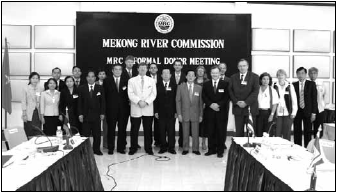
The donors and delegates at the Informal
Donor Meeting in
Vientiane.
On June 28 2007 delegates from Cambodia, Lao PDR, Thailand and Viet Nam, together with representatives of the international donor community, partner organisations and development banks gathered at the MRC Secretariat in Vientiane for the annual Informal Donor Meeting.
H.E. Mr Sin Niny, Chairman of the MRC Joint Committee for 2006/2007 told the meeting that support from donors had been very strong over the past year with more than US$23 million pledged for programme work.
Prior to the meeting there was a special session of the MRC Joint Committee to discuss the approval of the recommendations of the Independent Organisational Review of the MRC and the National Mekong Committees and the statement originating from the International Conference on the MRC held in Hanoi in April.
The main aim of this conference was to further strengthen the MRC's position in the Mekong region, while the review highlighted areas for improvement within the organisation.
The meeting heard about the progress of the programme work of the MRC as well as its progress toward implementing the goals of the Strategic Plan and took time to discuss recommendations arising from the conference and the review, with many being accepted.
With the aim of becoming a totally country-run organisation within the next few years there was also discussion on the progress of the Roadmap to Riparianisation of the MRC Secretariat. It was decided that as many professional positions within programmes should be filled by riparian staff as soon as possible, subject to there being suitably qualified candidates. The donor group expressed strong support for this goal.
Donors and delegates also exchanged views on ways to increase aid effectiveness through the MRC's donor harmonisation suggestions, which would streamline reporting and funding modalities and involve new funding vehicles such as the Mekong Water Management Trust Fund. This would increase the efficiency of the Secretariat while reducing the workload of individual programmes.
The idea of funding an overall programme of the MRC rather than programme by programme also came under consideration.
Other talks centred on the MRC's active involvement in the Mekong Water Resources Partnership Programme with the World Bank and as other collaborative activities.
Data input issues dominate 5th Mekong Flood Forum
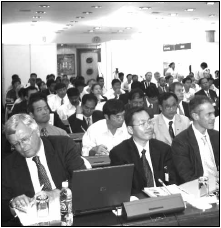
Delegates listen to the presentations
at the Flood Forum.
MORE than 130 participants from 17 countries attended the 5th Annual Mekong Flood Forum in Ho Chi Minh City, Viet Nam on May 17 and 18, 2007 to share information on “Improving Data Inputs Towards Medium-term Flood Forecasting and Warning in the Mekong Basin”, the theme of this year's forum.
The Forum, which was organised by the MRC's Regional Flood Management and Mitigation Centre (RFMMC) was officially opened by Mr Nguyen Hong Toan, Secretary-General Viet Nam National Mekong Committee and MRC Joint Committee Member for Viet Nam.
Mr Toan told the forum delegates it was up to the MRC member countries to increase cooperation in their data exchange to ensure the MRC's Flood Management and Mitigation Programme (FMMP) could meet the flood forecasting needs of the basin's people.
In his welcome remarks, MRC Secretariat CEO Dr Olivier Cogels also emphasised the urgent need to improve the quality and timely exchange of flood information most importantly to save human life, but also to protect property, agricultural land and livestock. He pointed out that changes in land use brought with them the potential to make more of the basin vulnerable to flood damage.
“Our member countries have established or are establishing a range of actions to enable them to cope with these changes but they need the tools, data and information to help them make the right decisions,” he said.
Participants heard about the progress being made on improving flood forecasting in the basin and also the key areas which need attention. They also had the opportunity to discuss emerging needs within the basin and to review the progress each country had made towards a balanced flood management plan.
The FMMP will support the member countries in preparing their own flood forecasting and early warning messages, taking of flood preparedness measures and emergency management, relief and reconstruction.
In order to provide timely information, state-of-the-art dataexchange tools will be required. Crucial elements with respect to the development of such an integrated approach are optimal quality and optimal flexibility of the tools to be applied. This will require strong cooperation of the MRC member countries, the Dialogue Partners and the RFMMC.
The forum heard that data requirements necessary for reliable short to medium-term forecasting included those concerning meteorology and weather forecasting, water level forecasting, effective early warning and flood preparedness measures and emergency management, relief and reconstruction. Information derived from the data has to be easily and clearly accessible to decison makers.
The RFMMC is modernising its tools and has recently decided to work with the hydrological database HYMOS and the hydrological flood routing model URBS.
This approach enables automatic exchange of data and immediate generation of information for accurate flood forecasting at short and medium term for the mainstream of the Mekong River. It also allows better exchange of information between the MRC member countries, Dialogue Partners and the RFMMC and will enable them to improve their own flood forecasting and early warning systems.
During the coming year this approach must become fully operational. It is expected that further progress can be reported in the 6th Annual Mekong Flood Forum.
HYCOS stations selected
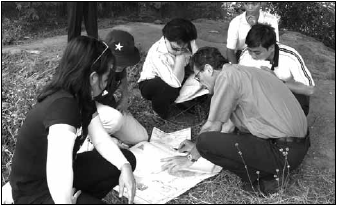
The team spends some time examining
the technical aspects
of a Thai installation.
After travelling 7,500 km by road and 13,000 km by plane the Mekong- HYCOS project team has completed its inspection tour of 45 hydrological measuring stations on tributaries and the Mekong mainstream in the Lower Mekong Basin.
The project management unit together with representatives of the relevant Line Agencies and NMCs in each of the member countries undertook the tour to ascertain which stations were to be selected for upgrading as part of the new Mekong-HYCOS project. The team also took some time out for training in the field.
The original decision on which stations could be upgraded with the new HYCOS equipment was made in the project document which was drafted in November 2005. But after the project started in January 2007 it was decided to make priorities for upgrading stations depending on the budget: around 25 stations in priority 1 and 10 stations in priority 2.
The decision to prioritise the stations was made through national consultations with country representatives and this was validated at a regional workshop held in Vientiane on 17-18 July 2007 and approved by the steering committee at its meeting on 19 July.
The next step is the tendering process for the hydrometeorological equipment (data loggers with water level and rainfall sensors) and for the the telemetry system to be used. The team must also to prepare the design of civil work and present this to country representatives in September/October. They will then tender for civil works.
The new equipment will allow for automatic transmission of data by SMS messages every hour or every three hours to Line Agencies, the Regional Flood Management and Mitigation Centre and the MRCS all at the same time.
Mekong-HYCOS will be part of the World Meteorological Organisation's (WMO) World Hydrological Cycle Observing System (WHYCOS) aimed at enhancing the collection and distribution of hydrological information through modernisation of national hydrological services. WHYCOS is being implemented as a number of regional components, referred to as “HYCOS projects”, each being designed to meet specific regional and national needs. The purpose or specific objective of the Mekong-HYCOS project is to establish a well functioning, reliable, accurate and timely hydrometeorological data collection and transmission system at basin level, while strengthening relevant national and regional capacities.
The project is planned from 2007 to 2011 with three main steps:
- The Inception Phase that will last approximately 12 months,
- The Construction and Installation Phase will be from January-June 2008 in time for the 2008 flood season; and
- Follow-up Phase lasting approximately 3.5 years in order to assure proper maintenance of equipment and training of the local staff and therefore ensure the project is sustainable.
Sediment study on Great Lake
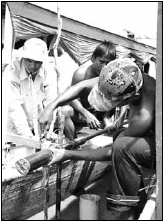
The team collects a core
sample from the bottom of
the Great Lake in Cambodia
The Information Knowledge and Management Programme (IKMP) is carrying out a Technical Assistance project for the MRC Navigation Programme on navigation improvements in the Great Lake in Cambodia.
The project which is being undertaken by a team of experts financed by Finland working within the IKMP is evaluating the technical feasibility of dredging a navigation channel across the lake to allow yearround navigation to Siem Reap.
The feasibility criteria in the study is to estimate the rate at which the channel may fill with sediment and the consequent need for maintenance dredging.
Sediment at the bottom of the lake is soft and this, combined with windwave induced water movements at the lake bottom, needs to be taken into account when planning such a channel. The tendency for such structures to fill in is more noticeable in the low water period when the water depth in the lake is only one to two metres.
The team is carrying out the work in collaboration with the Department of Hydrology and River Works of Cambodia, the Southern Institute for Water Resources Research in Ho Chi Minh City and the Technical University of Budapest, Hungary. The project contains field surveys, laboratory tests as well as hydrodynamic and sediment model studies. The results of the feasibility study will be reported in September.
Monitoring sediment movement is a complicated process and necessitates using the most up-to-date modelling tools in the analysis. The IKMP team is facing similar challenges in other ongoing projects. These include modelling the hydrodynamic and water quality processes in the complex canal-river-floodplain system in Cambodia and the Mekong Delta, and the primary productivity of the Great Lake-Tonle Sap floodplain system.
This productivity is linked to the annual process of successive flooding and drying of the floodplain, known as the flood pulse. The model study aims assess if productivity is affected by developments and changing flow regimes in the Mekong Basin.
In Vientiane, Lao PDR pilot work is ongoing in coupling the river flow model with measured river bank stability data. Practical output will be estimates of actual bank erosion rates and assessment of bank protection needs in hot spot areas.
Fisheries experts take knowledge to the region
As part of their work to increase fisheries knowledge in the region Mr Kaviphone Phouthavongs and Dr Suchart Ingthamjitr from the MRC Fisheries Programme acted as trainers in a recent joint training exercise for community-based aquaculture in remote rural areas.
The course, which was held in Lao PDR in July, was part of a project on the “Promotion of Sustainable Freshwater Aquaculture for Rural Communities” and this initial exercise was to train the trainers.
The project which is being initiated by The Southeast Asian Fisheries Development Centre (SEAFDEC) with funding support from the Japanese Trust Fund, is being implemented in collaboration with the Department of Livestock and Fisheries of Lao PDR, the Department of Fisheries of Thailand, the MRC Fisheries Programme, and the WorldWide Fund for Nature in Lao PDR.
This Training-of-Trainers (TOT) was conducted for 23 aquaculture extension officers from eight Asian countries including the four MRC Member States, Myanmar, Indonesia Malaysia and the Philippines.
Specifically, the training aimed to provide the participants with:
- knowledge in working with communities through participatory approach;
- additional knowledge on freshwater aquaculture systems (from broodstock development to seed production, nursery and grow-out), particularly for indigenous species;
- skills in the transfer of freshwater aquaculture technologies in rural areas (eg integrated freshwater aquaculture techniques); and,
- skills in extension services. The course included practical sessions in the field and both study and site visits.
Once trained, the trainers will focus on the promotion of appropriate aquaculture systems that can be applied in remote rural areas in Southeast Asia. An important component of the capacity building will be to compile existing regional competence and experiences in matters of interest and share these among the other countries.
Apart from the MRC, other trainers came from the Thai Department of Fisheries, SEAFDEC Aquaculture Department, WorldWide Fund for Nature and the Living Aquatic Resources Research Center.
MRC Secretariat CEO completes term of office

Dr Olivier Cogels has left the MRCS
DR OLIVIER COGELS, the Chief Executive Officer of the Mekong River Commission Secretariat completed his three-year term of office on 9th August 2007. He chose not to apply for a second term.
In a farewell speech to staff of the Secretariat he said, while he was obviously sad to leave his team, his time heading the Secretariat had been extremely rewarding and much had been achieved in the past three years.
“During my mandate I feel we have successfully steered the MRC toward a common goal - that of an international river basin organisation which, more than in the past, concentrates on developing its water resources for the economic benefit of the people and their countries,” he said.
“I am proud to have played my part in refocusing the MRC's goals to put development and poverty alleviation higher on the agenda.
“As a direct consequence of this new orientation the MRC should now be able to develop its capacity to become a powerful player in the region, but it will need development partners and political leaders to put their weight behind the organisation's new focus.
“In particular this approach has brought a major change in our relationship with China, which is now more willing to enter into joint cooperation on navigation and on modelling and computerised systems. I also hope we will cooperate on the operating rules of the dams being constructed on the Lancang.”
Dr Cogels said he felt the MRC was in a stronger position today. It had formulated an ambitious Strategic Plan which would provide the path for the MRC's future work and had introduced the concept of the Mekong Programme to the region. This is a development and investment programme owned by the member countries.
A coordinated programme structure had also been established within MRCS and this would bring about more efficient operations.
He added that the finances of the MRC were very sound. In the past three years, following some solid fundraising efforts, the yearly amount of funding available for MRC's work had almost doubled.
MRC had also expanded its working relationships with the development banks and was willing to play a larger role in regional schemes such as the Greater Mekong Subregion initiative.
Dr Cogels said he was pleased to see the MRC was now poised to capitalise on these achievements and move toward becoming a stronger, countrydriven international river basin organisation that would bring more benefits to the member countries.
Dr Cogels will return to his career as a senior international consultant in the water resources management field and continue as an extraordinary professor in IWRM with the Catholic University of Louvain in Belgium.
Japan supports Hydropower Programme through ASEAN
ASEAN through the Japan ASEAN Integration Fund (JAIF) sponsoring body is to fund an MRC project on hydropower in the Mekong Basin.
The Project, entitled Initial Analysis of Hydropower Potentials in the Lower Mekong Basin (LMB) in relation to Cumulative Transboundary Impacts will culminate in the formulation of an MRC Hydropower Programme.
The work envisaged in this proposal is composed of three components: Data collection in the Lower Mekong Basin and formulation of the MRC hydropower programme; initial analysis on benefits and cumulative transboundary impacts in the LMB; and organisation of regional meetings for collecting comments from member countries and stakeholders for inclusion in the programme document.
Studies will incorporate the current and planned hydropower projects in the LMB, a review of previous studies and documents related to hydropower potential, power development plans and development scenarios, economic and technical analysis of the value of hydropower, hydrological assessments on the flow regime, flood reduction effects and social and environmental impacts.
There will be involvement from national planning and water related ministers as well as power companies from the riparian countries and national and regional stakeholders. Based on the result of these studies MRC will prepare a hydropower programme document to seek funding.
The MRC has an important role to play in hydropower development within the basin with regard to transboundary issues and projects with basinwide impacts and to common projects which involve two or more MRC countries.
It can also provide technical and managerial expertise to member countries and funding agencies and become involved in planning, monitoring and mitigation measures if requested.
MRC maps floods for Chiang Rai

Lower Kok River Basin - the pale grey
area shows approximate area flooded in 2005
The Flood Management and Mitigation Programme, the Information and Knowledge (IKMP) Management Programme and the Thai Department of Water Resources (DWR) have launched a flood management project in the Kok River Basin in Chiang Rai Province.
The Strengthening of Flood Management Capacity for the Kok River Basin in Chiang Rai project aims to gather sufficient technical data to produce flood models and flood probability/vulnerability maps which will improve flood preparedness in this region.
The site at Chiang Rai was chosen following a request from the Thai National Mekong Committee to launch a pilot project for flood mapping and modelling in this region.
The Kok River is a significant tributary and in the past few years Chiang Rai has suffered some bad flooding, including flash floods. Records show more than 60 flood events and landslides every year.
The project will construct housings and install hydrometeorological equipment in five measuring stations on the Kok River, three are already there and two new ones will be established.
The Thai DWR will initially undertake topographic and hydrographic mapping as well as GIS and remote sensing studies of the region. It will also collect information on current flood protection and infrastructure. When the equipment is installed it will conduct operations at the stations and measure water levels, flow velocity and discharges.
All this data will be fed to DWR and MRCS via satellite and internet every hour and IKMP will use this to calibrate a model for flood probability mapping. These maps will help the relevant authorities in land planning and emergency preparedness and management to make better decisions.
It is hoped that the initial stages of this project will be completed this year and the completion of the stations will be ready for the next flood season.
At the conclusion of the one-year project, outputs will be used as a model for projects on other tributary sites in the basin.
While this project gets under way, another measuring station site is also being established on the Mekong mainstream, with the housing being in front of the MRC Secretariat in Vientiane, Lao PDR. It will be used as a demonstration site for donors and visitors as well as a training ground for country staff and a repository for spare parts if needed urgently
Indices will help spread health message
The Environment Programme is developing a selection of indices for its water quality and ecological health work in order to be able to present complex environmental information in a simple way.
In order to determine water quality it is essential to combine a number of important parameters to provide an index for the protection of aquatic life. However, development of such an index requires a lot of care.
The index is intended to reflect the suitability of the water at a site for supporting aquatic organisms. It will be based on integrating the monthly sampling over a period yet to be decided on (most probably one or three years).
For aquatic ecological health the programme studies four sets of organisms: insects at the river's edge and on the bottom in the middle of the river (littoral and benthic macroinvertebrates); zooplankton and small algae on substrates (diatoms).
Depending on the biodiversity of the organisms and the abundance of different groups (sensitive or tolerant organisms) the team can develop a score and compare it against a guideline.
A site which is diverse and has many sensitive species is considered in good condition whilst the reverse (low diversity and many tolerant species) is considered in a more degraded condition.
For both water quality and aquatic ecological health the results will be presented as the condition of the sampling sites on a map which will provide an overall picture of the condition of the basin.
It is hoped that in the near future the indices will be ready to use for information materials targeting the general public.
Information Products
MRC Annual Report 2006
The Mekong River Commission’s Annual Report 2006 presents key achievements and progress made by the organisation’s programmes in 2006. It also contains articles on the recently approved Strategic Plan 2006-2010 which outlines the MRC’s future goals, the second phase of the BDP and a new navigational system for the Mekong River. June 2007 Free (Postage applies) |
Diagnostic study of water quality in the Lower Mekong Basin MRC Technical Paper No 15
This report presents the results of an analysis of the physical and chemical water quality of the lower Mekong Riversystem, based on water and sediment samples collected during 2003 and 2004. The study establishes current baseline conditions for environmental contaminants and recommends future water-quality monitoring exercises. May 2007. US$5.00 (plus postage) |
|
Annual Mekong Flood Report 2006
The Annual Mekong Flood Report 2006 takes a historical look at the flood regime of the Mekong River and allows the reader to put modern floods into perspective. The report includes much hydrological information on the annual Mekong flood as well as specific country reports on the 2006 flood with details of damage and loss. April 2007 US$10.00 (plus postage) |
Catch & Culture
These issues of Catch and Culture feature a selection of the best articles which appeared in the 2006 English language editions of Catch and Culture and which are most applicable to individual member countries. All articles have been translated into Thai and Lao. Free (postage applies) |
|
| How to order | Contact | |
| All products can be ordered from the MRC Secretariat’s Documentation Centre. Postage costs apply. Mekong region government agencies may write to the MRC to obtain free copies. Check the MRC website for a full list of products. Credit card sales are also available through the website, www.mrcmekong.org/publications/. All products are also available as free downloads from the MRC website. | Documentation Centre Mekong River Commission Secretariat
P.O. Box 6101, 184 Fa Ngoum Road, Unit 18, Ban Sithane Neua,
Sikhottabong District, Vientiane 01000, Lao PDR Phone: (856 21) 263 263 ext: 1122 Fax: (856 21) 263 264 Email: doc.centre[at]mrcmekong.org (replace [at] with @) Website: www.mrcmekong.org |
26th Meeting of the MRC Joint Committee
Meeting
29-30 August, Vientiane, Lao PDR
email: schiefer@mrcmkong.org
10th International Riversymposium and Environmental
Flows Conference.
3-6 September, 2007, Brisbane, Australia.
www.riversymposium.com
3rd International Conference on Water and
Climate
3-6 September 2007, Helsinki, Finland
www.symparisto.fi/default.asp?contentid=169172&lan=en
Fisheries data collection and analysis
training course
Wageningen, the Netherlands, October 1-19,
2007.
E-mail: training.wi@wur.nl
www.cdic.wur.nl
3rd South East Asia Water Forum
22-27 October 2007, Kuala Lumpur, Malaysia
http://3rdseawf.water.gov.my
14th Meeting of the MRC Council
November, Siem Reap, Cambodia
email: schiefer@mrcmekong.org
12th Dialogue Meeting
November, Siem Reap, Cambodia
email: schiefer@mrcmekong.org
5th International Symposium on Environmental
Hydraulics (ISEH V)
4-7 December 2007, Tempe, Arizona, United
States
www.iahr.net/iseh/home/index
Expo Zaragoza 2008 'Water and Sustainable
Development'
14 June - 14 September 2008, Zaragoza, Spain
www.unesco.org/water/water_events/Detailed/1422.shtml
13th World Water Congress
1-4 September 2008, Montpellier, France
Organizer: International Water Resources Association (IWRA)
www.unesco.org/water/water_events/Detailed/1406.shtml
Choose a newsletter:


